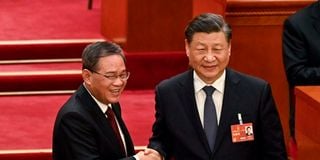Partnering with China best bet for Africa’s green bid

China's President Xi Jinping (R) shakes hands with newly-elected Premier Li Qiang (L) during the fourth plenary session of the National People's Congress (NPC) at the Great Hall of the People in Beijing on March 11, 2023.
In Africa, Japanese or European vehicles dominate the roads. But in the burgeoning sector of new energy vehicles (NEVs), Chinese manufacturers are emerging as the frontrunners.
The world is moving towards sustainable development and Africa is keenly partaking in this green evolution.
And China, the premier manufacturer of eco-friendly products, plays a dual role: Spearheading its domestic transition towards sustainability and propelling global green transformation.
In his government work report, Prime Minister Li Qiang said China’s exports of electric vehicles (EVs), solar cells and lithium-ion batteries soared by 30 per cent last year in a record trillion yuan.
The “New Three” have overtaken the traditional “Old Three” exports of household appliances, furniture and clothing, becoming the new expert backbone.
In Nairobi, the popular motorcycle taxis, “boda bodas”, are transitioning to electric models, predominantly sourced from China. And the journey to Jomo Kenyatta International Airport might now be aboard an electric bus manufactured by China.
Kenyan President William Ruto announced an ambitious plan to develop the e-moto industry, introducing a million electric motorcycles and 3,000 battery charging stations nationwide.
Dr Ruto says the initiative is not merely an economic or technological leap but a critical measure against pollution, adverse health effects and fuel costs.
This is part of a larger African endeavour. Egypt is investing $1.35 billion in EV infrastructure, including charging stations and manufacturing plants. Ethiopia has rolled out policies to boost EV adoption. South Africa aims at increasing EVs to 25 per cent of its overall new cars sales by 2035.
Benefit ordinary people
Numerous African startups are teaming up with Chinese firms to bring in affordable, efficient and eco-friendly NEVs, which benefit ordinary people. For example, Nairobi drivers earn $10 a day on average. They would spend $6 on petrol but, by going electric, no more than $1.42. So their profits are up.
China’s automobile exports jumped 30.5 per cent year-on-year in the first two months of 2024. Then, China exported 182,000 NEVs, up 7.5 per cent, underscoring its commitment to green technology and sustainable development. At the China Development Forum 2024, PM Li emphasised China’s dedication to high-quality development, aiming at the recovery and stability of the world economy.
Africa is set to benefit from China’s high-quality development under China-Africa cooperation. On January 7, China’s state council approved a plan to build a pilot zone for in-depth economic and trade cooperation between China and Africa. This may open doors to burgeoning sectors like the digital economy, green development, public health, cultural exchanges and even artificial intelligence (AI).
Africa’s rich mineral resources, crucial for battery production, position it as a key player in the NEV market. With China providing the necessary technology and products, the continent is poised for a transformative leap towards sustainable transportation. That could take time but is promising.
- Ms Gao is a reporter with CGTN Radio. [email protected].





